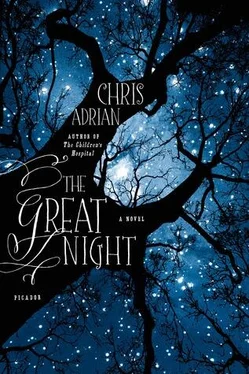Chris Adrian - The Great Night
Здесь есть возможность читать онлайн «Chris Adrian - The Great Night» весь текст электронной книги совершенно бесплатно (целиком полную версию без сокращений). В некоторых случаях можно слушать аудио, скачать через торрент в формате fb2 и присутствует краткое содержание. Год выпуска: 2012, Издательство: Picador, Жанр: Современная проза, на английском языке. Описание произведения, (предисловие) а так же отзывы посетителей доступны на портале библиотеки ЛибКат.
- Название:The Great Night
- Автор:
- Издательство:Picador
- Жанр:
- Год:2012
- ISBN:нет данных
- Рейтинг книги:4 / 5. Голосов: 1
-
Избранное:Добавить в избранное
- Отзывы:
-
Ваша оценка:
- 80
- 1
- 2
- 3
- 4
- 5
The Great Night: краткое содержание, описание и аннотация
Предлагаем к чтению аннотацию, описание, краткое содержание или предисловие (зависит от того, что написал сам автор книги «The Great Night»). Если вы не нашли необходимую информацию о книге — напишите в комментариях, мы постараемся отыскать её.
. On Midsummer’s Eve 2008, three brokenhearted people become lost in San Francisco’s Buena Vista Park, the secret home of Titania, Oberon, and their court. On this night, something awful is happening in the faerie kingdom: in a fit of sadness over the end of her marriage and the death of her adopted son, Titania has set loose an ancient menace, and the chaos that ensues upends the lives of immortals and mortals alike in a story that is playful, darkly funny, and poignant.
The Great Night — читать онлайн бесплатно полную книгу (весь текст) целиком
Ниже представлен текст книги, разбитый по страницам. Система сохранения места последней прочитанной страницы, позволяет с удобством читать онлайн бесплатно книгу «The Great Night», без необходимости каждый раз заново искать на чём Вы остановились. Поставьте закладку, и сможете в любой момент перейти на страницу, на которой закончили чтение.
Интервал:
Закладка:
It felt like he had been walking in a circle, always uphill. He had passed some landmarks that he recognized from the miserable outing with Bobby: the tennis courts, where some homeless people seemed to be settling in for an early bedtime; a willow whose droopy branches hung low enough to scrape the path. He passed the shin-high stone wall, made with old pieces of headstone, that wound along the path to the steep stairs that rose to the bald little crown of the park. He’d started up those stairs but never arrived at the top of the hill. Every hundred steps or so he paused, and looked around, and saw the same thing: a darkening vista of pale eucalyptus trees in the steep ravines, and through them a glimpse of the city below the hill and, beyond that, the bay and the bridges. But glimpse by glimpse, the city was obscured. It hadn’t been particularly foggy when Henry had left his house, but it rolled in precipitously while he walked the steps, and soon he could only see a wall of fog beyond the trees, roiling and heaving as if it were breaking upon an invisible barrier.
The steps led to still more steps. He thought he must have taken some detour without noticing, because soon he was going straight across the hill and then down before he went up again, and then he was deposited in a little clearing, a flat field cut into the side of the hill and ringed by trees. There was a rock with a flat seat and a high back that looked, to someone who had been walking uphill for twenty minutes, a lot like a chair.
Henry sat down and kicked off his shoes and put his feet in the soft grass. This was a pretty ordinary gesture, but for him it was still something of an extraordinary accomplishment. Once he had a terror of the ground, because it was dirty in the ordinary sense of dirty, and because it was dirty in all the new, miserable ways he had learned things could be dirty since the threat of true love had turned him into a younger, poorer sort of Howard Hughes. He wanted to say, Bobby, this is nice! because it was nice. The grass was soft and cool and dry, and though he thought he could properly appreciate it through his socks, he took those off, too, and dug his toes into the tight spaces between the blades until he could feel the deeper cool and softness of the soil underneath. In the first days of his recovery, he had done things like this demonstratively, always showing off for his absent, rejecting ex-boyfriend, but soon he was doing all the formerly forbidden things for the joy of them, because it was lovely and interesting and sustaining to put one’s feet in the grass, or to shake the paw of a strange dog, or even marvel over some pornographic vagina, formerly the abomination of abominations and the anathema of anathemas. Now, beyond any hope of reunion with old stay-the-fuck-away-from-me Bobby, Henry had nothing left to prove, and for the first time in forever he did things for no other reason than because it made him happy to do them.
He sat for a while appreciating his feet on the grass, and appreciating the feeling of his bottom and his back against the stone, and wondered if this could reasonably be considered the end of the night. He had already socialized more in twelve hours than he had done in a typical month of days in the past year, even though he hadn’t made it to the party and the only interactions he’d had so far were smiling at some friendly men on Eighteenth Street and a short talk about the possibility of fog with a pierced-up fellow in a café on Haight and Scott, where he’d stopped just before heading up the hill. There were nights back when he lived in Boston when he would never venture out of his apartment, because it was too much effort to get out of bed, or put on his shoes, or navigate the gauntlet of contamination that the mailman, who might have touched a letter that touched a letter that touched a letter that his mother wrote, left around the front door and the stoop and the sidewalk. He had gone days without talking to anyone, and when he did talk to anyone it was usually Bobby, who happened to live next door for the whole first year after they broke up, and who, from Henry’s kitchen window, could be observed talking on the phone, or eating cereal, or frolicking with his new dog. Some nights he closed every shutter in his house and left Henry to speculate miserably about what might be going on behind them.
It was almost enough, to have tried to go to the party and to have made an honest effort to be sociable. Giving up and going home, when the party was simply not to be found, did not make him a depressive recluse, did not make him what he was before losing Bobby had caused him to come to his senses. He could not be blamed for going home, and yet, when he really considered it, he decided that he didn’t want to go home. Other people had become a whole lot more interesting since he had been freed from the labyrinthine solipsism of his self-enforced misery. He could not previously have imagined a more boring waste of time than to go and drink in the company of strangers and quasi-strangers, but now there was something decidedly intriguing about it, even if he was enough of his old self to feel that sitting alone on a rock in the middle of the park in the late evening was its own sort of good time. Rather slowly, he decided that the night had only just begun, and he was in no hurry to get home, and he would get to the party eventually. For now, he continued to sit on the rock.
It was pleasant to sit still, in part because there was a lot more to experience and feel, even sitting and doing nothing, than there had been when he was his old self, and also because he was chronically exhausted, both from the relentless succession of twelve-hour workdays he was suffering under in his new job and the relentless procession of doomed cancerous children who crossed his path. He had started thinking that he had picked his profession because it was guaranteed to provide an inexhaustible source of profound sadness, for how wonderful that must have seemed to the old Henry Blork, who thought sadness was his lot, and for whom it was a simultaneously sustaining and debilitating atmosphere. Any rest was to be cherished, though it left him open, like sleep did, to affectionate but utterly useless thoughts about Bobby. It did no good anymore, here beyond any hope of a reconciliation, to think of him, and yet Bobby was all Henry could think of when he wasn’t forcefully distracted. There were other things to think about: dying teenagers on the Oncology Service at the hospital; whether or not his drug-addled ex-con sister was going to make it on her own now that their mother was dead; what kind of dog he would get when he got a dog. But he hardly touched his mind to any of these subjects when thoughts of Bobby intruded on them. He wondered if the teenagers would die without ever being in love, and any thought of love led back to Bobby. Thoughts of his sister led to thoughts of Bobby’s brother, an analogously drug-addled beautiful soul who had died hardly two years before Henry and Bobby had met. And any thoughts of a dog led in prancing leaps to thoughts of Bobby’s dog, a black Lab named Hobart whom Henry had come to love almost as much as he loved his master.
It ought to be possible, he thought, to will himself not to think about him. Back when he would still return his calls, Bobby had described, rather too proudly, a process like that, by which he had forcibly lifted himself out of love with Henry, into a place where Henry didn’t cross his mind at all hours of the day, and distract him from every task, and invade his dreams, and loiter in his masturbatory fantasies. “It was a lot of hard work,” he told Henry, implying that Henry had a lot of hard work himself to get to this loveless place. “That’s the most horrible thing I ever heard,” Henry had said, and Bobby had replied, “You say that now, but just wait.” Henry had done just the opposite thing, it seemed to him, falling every day more deeply into love while Bobby lifted himself ever higher out of it, until they could not possibly have been farther away from each other. Henry sighed and closed his eyes, suddenly feeling lost and trapped, in the park, in his feelings, and in the world at large. He began to think about how strange and stupid it was that his love for Bobby had, too late, displaced a combination of guilt and shame and sorrow as the organizing principle of his life, and he considered how wonderful it would be to live under that organizing principle of love if Bobby could return it again.
Читать дальшеИнтервал:
Закладка:
Похожие книги на «The Great Night»
Представляем Вашему вниманию похожие книги на «The Great Night» списком для выбора. Мы отобрали схожую по названию и смыслу литературу в надежде предоставить читателям больше вариантов отыскать новые, интересные, ещё непрочитанные произведения.
Обсуждение, отзывы о книге «The Great Night» и просто собственные мнения читателей. Оставьте ваши комментарии, напишите, что Вы думаете о произведении, его смысле или главных героях. Укажите что конкретно понравилось, а что нет, и почему Вы так считаете.












